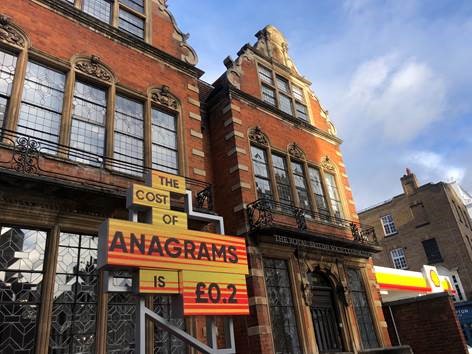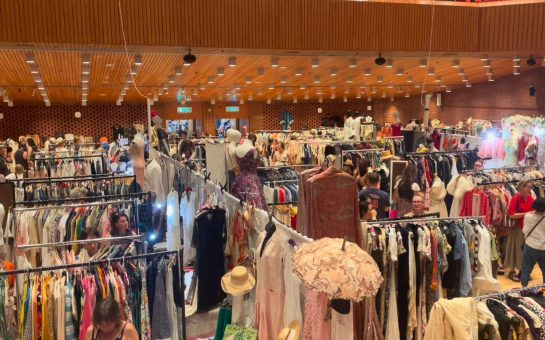Combining powder-coated steel, LED displays and Google Adwords, a new sculpture in South Kensington is highlighting how digital technology affects the way we view the world.
‘The Cost of Your Words’ is a bold digital artwork by Italian artist Fabio Lattanzi Antinori, visualising the cost-per-click of the most relevant online keywords in that area such as BBC, Cubism, and Word.
The sculpture is a result of the artist winning the First Plinth: Public Art Award from the Royal Society of Sculptors, a charity established in 1905 to celebrate contemporary art.
Exhibited on the sculpture terrace of the society’s headquarters on Old Brompton Road, the billboard-like installation strikes a contrast with the building’s gothic exterior.
Stranger still, the graphics announce the price of several different words, tracking their prevalence through a live feed from Google Adwords that is geo-localised to South Kensington.
Whilst displaying how search words have become a commodity with a financial value, the installation also refers to the way our online choices are influenced by personalised algorithms and the sinister implications of this manipulation.
Lattanzi Antinori, based in east London, has built up a career analysing financial data in his artwork, relying on data as a means to find out ‘Why do we believe what we believe in?’
In this work, he takes a new direction, combining both the physical elements of the installation with the invisible data part, but this time using AdWords which allude to the language of advertising.
Antinori said: “I wanted to give all of us a hint, and a little polite reminder, that whatever we have experienced online is just something that is heavily curated for us.”
“It’s meant to say hey, are we actually free? Is the internet free?”
He explained that due to the growth of personalised algorithms and SEO profits, unbiased content has become less accessible, as companies steer the attention of people towards what they might like, all the while generating profit from this digital manipulation.

Antinori mentioned the Facebook-Cambridge Analytica Scandal, in which millions of Facebook users’ personal data was acquired without consent.
He said: “Once you have the data and you know what the people might be interested in, you can find out how to influence them.”
Antinori traces his fascination with data back to his study of Computational Studio Arts at Goldsmiths University, and his struggle with cancer.
In what he described as a “wake-up call”, he was given a survival rate which made him question the objectivity of reality.
He recalled: “So does this mean I will die in three years?
“All of a sudden I became a number and I started wondering what numbers are all about – what do they mean? You start believing them, because they’re all you have.”
In ‘The Cost of Your Words’, which took a year to create, he shows how this data as a “truly reliable version of reality” is now manipulated by the new age of digital and surveillance capitalism.
Describing the internet as a corporate driven experience, Antinori questions who will ever step in to control it when companies have proven not to.
He was surprised by the US Government lawsuit against Google for using anti-competitive tactics to preserve its monopoly over internet searches and online advertising.
However, he said that the future is still not pink.
He expanded: “I don’t think the market will ever self-balance itself and I don’t think these companies are doing everything they can do to help us out. It looks like a remedy to the damage is giving us more technology.”
Troubled by the future of the digital world, with its impermanent and transcient nature, Antinori believes that if this data manipulation continues it won’t lead to “a nice society” and “opportunities for true happiness for every individual.”
Antinori created ‘The Cost of Your Words’ to spread awareness about these dangers, a purpose which is heightened by its status as public art and its location in central London.

Whilst this is Antinori’s first endeavour into public art, it will not be his last.
He said: “It’s amazing to see the immediate reactions that people might have to the work you’ve created.
“When art is public people can immediately relate to it and react to it. Once you take it out of a museum, it becomes what it is ultimately meant to be.”
Whilst people may not recognise that this ‘billboard’ is art, Antinori said: “I like the idea that it breaks those conventions because I believe contemporary art is for all of us.”
Antinori thanked the Royal Society of Sculptors, engineering firm WSP and gallery Pi Artworks for their help and collaboration towards this project.
The sculpture will move to Queen Elizabeth Olympic Park in Stratford in January after five months in situ outside the Royal Society of Sculptors.




